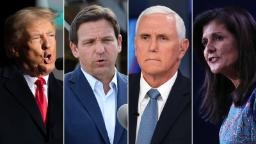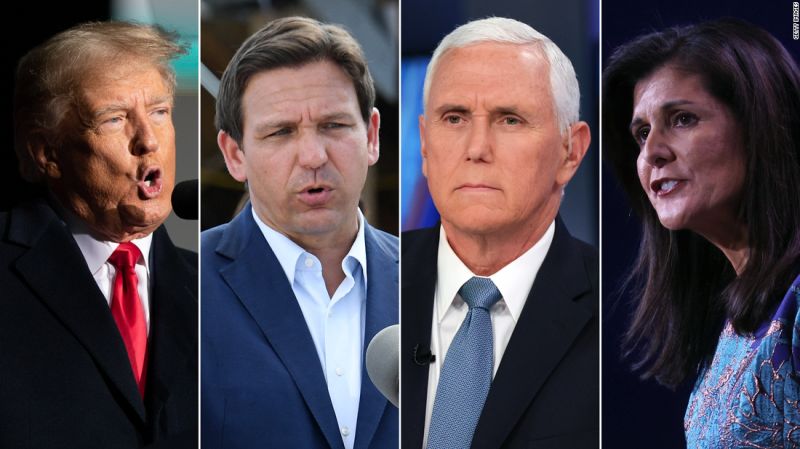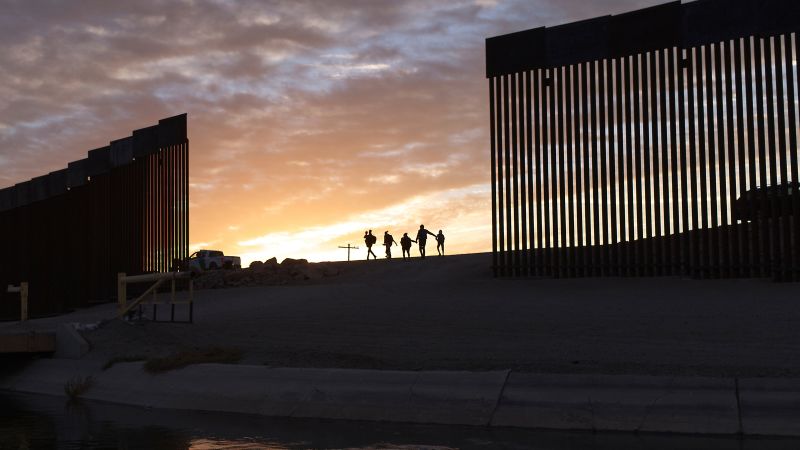
CNN
—
As former President Donald Trump heads to Texas on Saturday for his first major campaign rally, the handbrake remains on for most of his potential 2024 rivals.
Trump will appear in Waco just a week after he predicted his own arrest in connection with a hush money case from 2016. In the days since, anticipation grew over a potential indictment from a Manhattan grand jury, with Trump warning early Friday of “potential death and destruction” if he’s charged, though no action was taken this week.
This latest melodrama for the former president is unfolding during an uneasy period for the rest of the 2024 GOP presidential field, which is mostly frozen in place as a host of rumored contenders travel the country to test-run their messages while also seeking to avoid conflict with Trump.
The former president, though, operates on his own schedule and, along with his allies, used his own announcement about a coming indictment to test the loyalties of his fellow Republicans.
“We all need to be speaking up against the political persecution of President Trump,” right-wing Colorado Rep. Lauren Boebert tweeted last weekend. “This is not the time for silence.”
What Trump and his supporters eventually heard was a field of would-be opponents rushing to their defense – yet another sign that former president’s grip on the Republican Party remains firmly in place.
Former Vice President Mike Pence, who has at times harshly criticized Trump over the latter’s role in the January 6, 2021, Capitol riot, fell into line almost immediately after Trump’s prediction last week.
“The fact that the Manhattan DA thinks that indicting President Trump is his top priority, I think, it just tells you everything you need to know about the radical left in this country,” Pence said in an ABC News interview last Sunday. “It just feels like a politically charged prosecution here.”
Former South Carolina Gov. Nikki Haley, who served as Trump’s ambassador to the United Nations, remains the only other candidate with an established national profile to formally enter the race. She too backed Trump after he floated his expected arrest, saying the potential case against him was “more about revenge than it is about justice.”
Meanwhile, Florida Gov. Ron DeSantis, who has projected a warrior-like persona in the run-up to his own expected campaign, is still months out from an announcement. Though he took a sharper, snarkier tone when discussing Trump’s legal troubles this week, it came as he faced the fallout from his own messy, conflicting series of remarks on the Russian invasion of Ukraine.
South Carolina Sen. Tim Scott, another potential contender, parried questions about Trump, and whether he was concerned by the behavior underlying the hush money case. Instead, he turned his ire on reporters and President Joe Biden.
“You know, one of the things I’d say is that red-on-red violence, so to speak, is something that the mass media enjoys,” Scott said on Fox New Thursday. “The road to socialism runs through a divided Republican Party. One thing we should do is keep our focus on the actual problem: That is President Biden.”
Further complicating DeSantis’s bid to shave support from Trump while energizing his own conservative base, his other would-be rivals – led by Haley and Pence – are increasingly framing him as a carbon copy of the former president.
The main difference: They can go after DeSantis without fear of reprisal from Trump or his supporters.
Pence has taken aim at DeSantis over the Florida governor’s home state war with Disney, which he targeted after the company pushed back against state GOP legislation banning certain instruction about sexual orientation and gender identity in the classroom, dubbed by critics as the “Don’t Say Gay” law.
The former vice president argued that DeSantis’ revocation of Disney’s special tax status went too far, and that such interventions violated his principles as a “limited government Republican.”
Both Pence and Haley have also insisted that “entitlement reform,” in the form of cutting benefits for seniors in an effort to combat what they’ve described as a funding crisis, would be on the table if they were elected. That position separates them from Trump and DeSantis – at least rhetorically – who have both pledged not to touch popular programs like Medicare and Social Security.
For his part, DeSantis has ignored pokes from more establishment-aligned Republicans, instead attempting to land subtle jabs on Trump. Asked about the rumors of Trump’s coming indictment, DeSantis on Monday said he “no interest in getting involved in some type of manufactured circus by some Soros DA,” a reference to Democrat Alvin Bragg and billionaire liberal donor George Soros.
But he followed that with a dig that raised the hackles of Trump and his top advisers.
“I don’t know what goes into paying hush money to a porn star to secure silence over some type of alleged affair,” DeSantis said to laughs from some in the press corps. “I just, I can’t speak to that.”
Trump promptly responded by posting a series of personal attacks against DeSantis on social media.
“Ron DeSanctimonious will probably find out about FALSE ACCUSATIONS & FAKE STORIES sometime in the future, as he gets older, wiser, and better known, when he’s unfairly and illegally attacked by a woman, even classmates that are ‘underage’ (or possibly a man!),” Trump wrote. “I’m sure he will want to fight these misfits just like I do!”
But his back-and-forth with Trump, which carried on after DeSantis landed a few more shots during an interview with Piers Morgan, was arguably less damaging to the Florida governor than his continued about-faces on Ukraine.
After being met with a barrage of criticism from prominent Republicans for initially describing Russia’s war in Ukraine as a “territorial dispute” in a statement to Fox News host Tucker Carlson, DeSantis subsequently insisted to Morgan that he had only been addressing a longer-running part of the conflict focused in eastern Ukraine and Crimea.
“That’s some difficult fighting,” DeSantis said of the region, “and that’s what I was referring to. And so it wasn’t that I thought Russia had a right to that (land), and so if I should have made that more clear, I could have done it.”
By Thursday, though, DeSantis has tracked back to a more populist position, saying in an interview with Newsmax that he cares “more about securing our own border in the United States than I do about the Russia-Ukraine border.”
The back-and-forth over Ukraine invited reproaches from Pence and Haley, along with foreign policy hawks like South Carolina Sen. Lindsey Graham, Florida Sen. Marco Rubio and former Wyoming Rep. Liz Cheney, who all at various times either mocked or scorned DeSantis’ comments
“When the United States supports Ukraine in their fight against Putin, we follow the Reagan doctrine, and we support those who fight our enemies on their shores, so we will not have to fight them ourselves,” Pence said in a statement. “There is no room for Putin apologists in the Republican Party.”
The broad backlash underscored DeSantis’ uniquely tricky path to the nomination. When he hewed to Trump’s position in his initial remarks, the party establishment and anti-Trump conservatives raced to condemn him.
But because DeSantis largely shares a voter base with the former president, staking out a clear position opposing Trump would be politically untenable.
It is a challenge he will need to meet – and solve – as the race becomes more intense and the waiting, for candidates and action in Trump’s legal cases, comes to an end.
Note:- (Not all news on the site expresses the point of view of the site, but we transmit this news automatically and translate it through programmatic technology on the site and not from a human editor. The content is auto-generated from a syndicated feed.))



